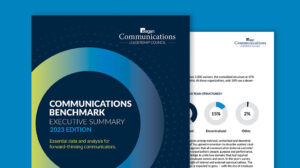The demise of the annual performance review has been greatly exaggerated
The classic employee evaluation tactic has fallen out of fashion in recent years, but a new survey shows companies can’t quite quit them.

How does your company evaluate employee performance?
New data shows that plenty of companies are still relying on old-school annual performance reviews. Sixty-three percent of employers still conduct formal performance reviews once a year, according to 344 U.S. companies which participated in XpertHR’s Performance Appraisals Survey 2021. Far fewer organizations conduct their reviews twice a year (18%) or quarterly (8%).
Other frequencies are even rarer. Only 2% perform reviews on an ad hoc basis, and 1% or less evaluate once a month, less often than once a year, once a week, or on a project-by-project basis.
“The results show that while there is talk of the demise of the annual performance review, it is still by far the most common frequency of performance appraisal,” notes Andrew Hellwege, surveys editor of XpertHR.
The survey also asked who provides feedback about the employee during the performance appraisal process, finding that virtually all (99%) of responding organizations noted the employee’s manager provides feedback, while just under one-half (47%) use the employee’s own feedback (such as via self-assessments).
Other options were less common, such as the employee’s colleagues (12%), clients/customers who interact with the employee (7%), the employee’s direct reports (7%), or some sort of “other” write-in option (5%). (Respondents could select more than one answer.)
“The survey shows that organizations are split about whether to include the reviewee’s input during the appraisal,” notes Hellwege, “with just under one-half of employers allowing the worker to provide their own feedback, such as via self-assessments.”
The survey also found that 38% of employers provide training about how to complete the performance appraisal process for both non-managers and managers, while 32% provide this training only for managers. About one-quarter (26%) provide no training to any employees.
“The results show that while 7 in 10 employers provide training to managers about the performance appraisal process, only about 4 in 10 provide training to non-managers,” said Hellwege. “Given this discrepancy in training access, organizations may want to evaluate their performance appraisal training programs to ensure that all employees—not just supervisors—are prepared for performance reviews.”
That is, unless you want to consider another way of evaluating workers’ performance.
Annual review alternatives
Performance reviews have been derided in recent years, with some calling them harmful, useless or even pointless and insulting. Of course, there’s nothing wrong with measuring how much employees are bringing to the table and identifying areas for improvement. Employee do crave feedback and direction, after all. And it’s essential for companies to ensure their investments in workers are paying off.
But surely there’s a better way to gauge accomplishments and measure progress than a yearly check-in?
If you’re keen to try another way, you have options. FlexJobs offers seven alternate ideas:
- Focus on accomplishments and goals.
- Have more frequent, informal reviews.
- Get more input from varied sources.
- Replace formal reviews with casual feedback.
- Separate feedback from compensation.
- Go digital instead of going face-to-face.
- Review the review.
Meanwhile, Fast Company offers these suggestions:
- Make sure that you give explicit instructions and absolute clarity on goals and expectations.
- Conduct one-on-one check-ins to gauge progress and discuss areas for improvement.
- Have conversations about the employee’s future.
- Use technology to solicit more candid feedback.
The piece sums it up: “Your employees do want feedback–but chances are they don’t want you to deliver it in an overly formal, stilted and outdated way.”
How about you, PR Daily readers? How does your company approach employee performance reviews?








Notice the opportunity presented if it’s correct that 47% of evaluations use the employee’s own assessment.
Olympic gymnasts are evaluated not only by how well they do but also by the difficulty of what they try for. If company management evaluates PR gymnasts partly by the VALUE of what they try for, opportunity knocks.
MEDIA COVERAGE may be mentioned often but accorded top value less often because (a) media coverage numbers are often exaggerated, sometimes ridiculously, and (b) media coverage is something the company can BUY and does all the time for advertising.
PUBLIC RESPONSE may be a better measure of PR performance quality
and can sometimes be measured by write-ins or clicks requesting more information. Sometimes you can even report accurately a “conversion rate,” a percentage of write-ins or clicks that turn into sales.
LOBBYIST PRAISE can be highly persuasive to management because what lobbyists work on are issues that may have a huge effect on company earnings. You can generate lavish praise from lobbyists if you generate millions of email letters to legislators. You can do this by getting heavy media coverage showing that what the lobbyists want will protect the public’s health, money or both.
When you help the public see a chance to save money, you may generate literally tons of mail especially from older people who are on fixed incomes, have time to write, may be looking for things to do, and vote a lot which many old people do.
MANAGEMENT PROTECTION is especially important to evaluators who see how PR enhances public esteem of management and because management’s evaluators know that in generating favorable public opinion, the ass you save may be your s own.
SELF-IMPROVEMENT effort shows what management values highly but often can’t measure, how much an employee TRIES to be better and do better for the company. If two employees are to be considered for promotion—and if one of the two has taken PR Daily or other such courses but the other employee has not—which employee is more likely to get the higher evaluation?
,